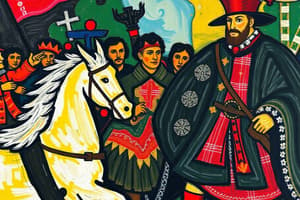Podcast
Questions and Answers
What was the main cause of the disputes between Charles I and the English Parliament?
What was the main cause of the disputes between Charles I and the English Parliament?
- Concern among some MPs about his plans to make England a Catholic country again (correct)
- The introduction of ship money in 1634
- Charles' marriage to a French princess
- Charles' belief in the Divine Right of Kings
What action did Charles take in response to Parliament's increasing criticism of his decision making and policies in 1629?
What action did Charles take in response to Parliament's increasing criticism of his decision making and policies in 1629?
- He criticized the Duke of Buckingham
- He introduced ship money in 1634
- He dissolved Parliament and ruled without them (correct)
- He sought assistance from Parliament to make decisions
What did Charles believe about his authority as the king of England?
What did Charles believe about his authority as the king of England?
- He believed in the Divine Right of Kings (correct)
- He believed he should only rule with the approval of Parliament
- He believed he should be criticized by Parliament for his decisions
- He believed he needed assistance from Parliament to make decisions
What was the consequence of Charles' refusal to criticize the Duke of Buckingham after a failed naval battle against the Spanish at Cadiz?
What was the consequence of Charles' refusal to criticize the Duke of Buckingham after a failed naval battle against the Spanish at Cadiz?
Why was William Laud's appointment as Archbishop of Canterbury unpopular?
Why was William Laud's appointment as Archbishop of Canterbury unpopular?
Why did the Scottish Puritans riot in 1637?
Why did the Scottish Puritans riot in 1637?
Why did Parliament place heavy demands on Charles when he urgently needed money to fight Scotland?
Why did Parliament place heavy demands on Charles when he urgently needed money to fight Scotland?
What was the outcome of the Parliament's vote on the Grand Remonstrance in December 1641?
What was the outcome of the Parliament's vote on the Grand Remonstrance in December 1641?
What led to Charles attempting to arrest 5 MPs in January 1642?
What led to Charles attempting to arrest 5 MPs in January 1642?
What action did Charles take in August 1642, indicating his response to Parliament's demands?
What action did Charles take in August 1642, indicating his response to Parliament's demands?
Flashcards are hidden until you start studying
Study Notes
Relationship Between Charles I and Parliament
- Charles I believed in the divine right of kings – absolute power granted by God.
- Parliament believed in the King's authority being limited by law.
- Charles dissolved Parliament in 1629 after clashes over policies and finances.
- He attempted to rule without Parliament for 11 years, utilizing "ship money" tax for funding.
Charles's Authority and Attempts to Govern Independently
- Dissatisfaction with Charles I's rule grew due to perceived abuses of power.
- He appointed the unpopular Duke of Buckingham to leadership positions despite failures.
- The Duke of Buckingham's failed expedition against the Spanish at Cadiz led to accusations of corruption and inefficiency.
- Charles' refusal to criticize Buckingham furthered the tension with Parliament.
Religious Disputes
- Charles appointed William Laud, Archbishop of Canterbury, a staunch supporter of the Church of England.
- Laud's policies, enforcing uniformity and rituals, alienated Puritan factions who favored simpler worship.
- This caused widespread discontent, particularly in Scotland, where Presbyterianism held sway.
The Scottish Rebellion and Parliament
- Scottish Presbyterians revolted in 1637 against Laud's attempts to impose the English prayer book.
- This rebellion threatened Charles's authority and forced him to summon Parliament in 1640 for funding and support.
- Parliament, emboldened by the Scottish crisis, seized the opportunity to assert its power and criticize the King's policies.
- Parliament demanded concessions regarding religious policies and governance before agreeing to pay Charles's expenses.
Growing Tensions and The English Civil War
- Charles attempted to negotiate with Parliament but faced stiff resistance.
- The Parliament's "Grand Remonstrance" condemned Charles's rule and proposed numerous reforms.
- The King's attempt to arrest five Members of Parliament in January 1642, deemed a breach of parliamentary privilege, escalated the conflict.
- Charles's actions were seen as an attack on parliamentary autonomy and further fueled the political divide.
- Charles raised his royal standard in August 1642, marking the official start of the English Civil War.
Studying That Suits You
Use AI to generate personalized quizzes and flashcards to suit your learning preferences.




